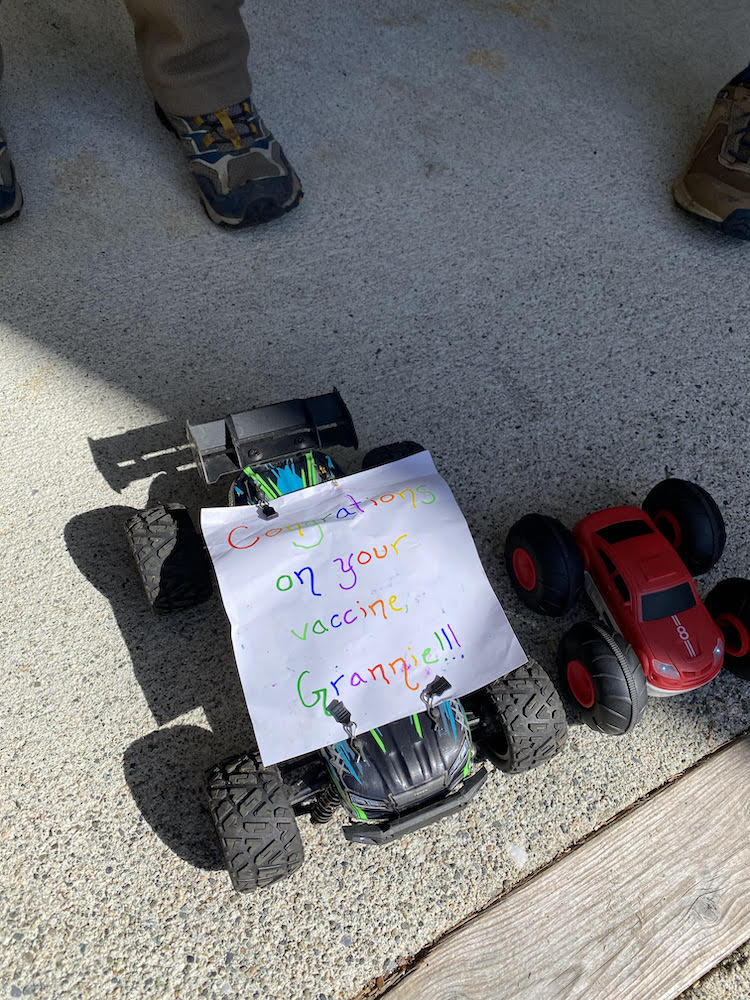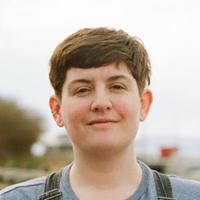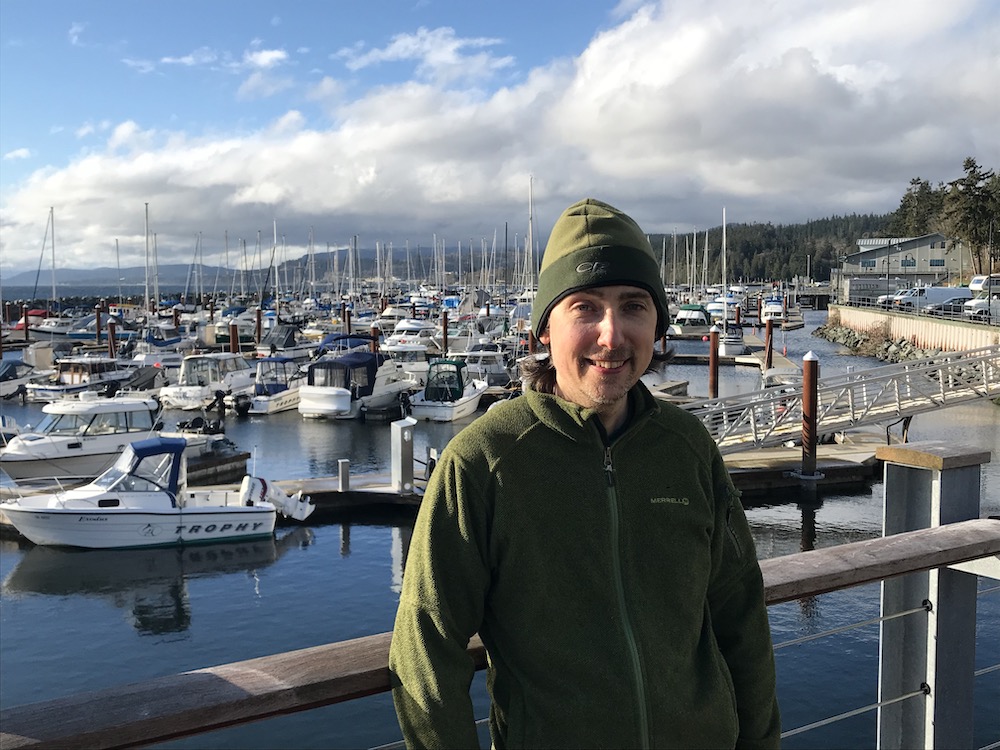“What a century this year has been,” wrote Joseph McLean. It was the end of December, and he was opening a long, reflective post about COVID-19 for the qathet COVID-19 Awareness Facebook group — a post that would range across the globe from Wuhan, China, to Powell River, B.C., a small city in the qathet Regional District on the northern Sunshine Coast.
McLean is 43 and first moved to the area with his mom at age six. Initially they lived around Lund, a historical end-of-the-road settlement spot for draft dodgers, just north of the Tla’amin Nation. McLean’s mother, Terry Flaubert, purchased land and — despite being, in her own words, “naive” about what the project would entail — built her own house there.
The qathet Regional District has a population of about 20,000. For comparison, that’s less than half of the undergraduate population of the University of British Columbia. Like many small places in B.C., it’s also arguably underserved by news media: while a small Glacier Media-owned paper regularly publishes local news online, its masthead only includes one staff reporter.
McLean’s group consists of 4,100 members, 3,000 of whom are active daily. Through the group, they’re receiving something close to service journalism — McLean disseminates information on mask mandates, restriction rollouts, testing availability and vaccine availability — as well as a sounding board for the kinds of rumours and speculation that can easily spread through small communities.
“I wanted a discussion that could be fact-checked, so that it wasn’t just a free-for-all,” says McLean. “Because at that point, you’d just have a thousand different opinions. And COVID wasn’t an opinion, it was a threat facing everybody.”
McLean launched the group in mid-March 2020. At first, its members consisted of a few friends. Within 24 hours, though, a few thousand people had signed up — a rumour, later debunked, had suggested that there were active cases in Powell River and people were worried, desperate for concrete information.
McLean declined to publish information about the rumour until it could be verified. “I’m not the god of fact-checking,” McLean says, laughing. “But maybe I’m a lesser deity.”
McLean runs a small computer-focused business in town and has been active in online communities since the ’90s, when he attended a computer school called Virtual High in Vancouver. Before he left for school, McLean says, he was working as a dishwasher. When he came back, he basically stepped into a full-time job fixing computers. Since the Usenet bulletin board era, he’s been online, moderating chat room discussions, hosting his own servers, joining what he describes as the “terrifying social magnet” that is Facebook.
This background — plus a community-minded focus he says he picked up from witnessing his mother’s strong volunteer ethic — positioned him to fill an informational niche in Powell River.
While the group is strongly moderated, McLean says he does his best to roll out the welcome mat. “If someone comes in and has some questions that are a bit beyond the pale,” McLean says, “I’m still going to engage with that, and answer those questions as well as I can, and hopefully by linking to things, or by quoting different scientific studies.”
North of town, the Tla’amin Nation was very transparent when COVID-19 impacted its community in the fall, releasing regular information about case counts and enacting a shelter-in-place order to stop further spread.
McLean, who’d been somewhat careful not to use the group to offer opinions on the provincial response to the pandemic, broke with his regular protocol to advocate for more transparency on local case count numbers.
“We only saw the Tla’amin count that was released daily,” McLean says. “Powell River, nothing. The more it went out, the more people who were tired of COVID started saying ‘Nothing means zero.’”
McLean believes that it was in part the leadership of the Tla’amin Nation that encouraged the province to finally begin to release information about local case counts in B.C.
The work McLean has done to share resources with his community has been recognized both by community health professionals, who have told McLean that patients or vaccine recipients often arrive to appointments with information they’ve gleaned from the Facebook group, and by Powell River Living, which named McLean the community’s “Best COVID-19 Crisis Leader” in July, beating out local MLA Nicholas Simons.
On April 4, McLean shared a post about the AstraZeneca vaccine’s arrival in Powell River. Appended to the post was a picture of Powell River resident Nicole Narbonne receiving the AstraZeneca shot.
“I feel like I will soon be able to see my granddaughter who was born during the pandemic, my father whose grip on reality slips a little every time I talk to him, my mother who turned 88 yesterday in Nova Scotia,” Narbonne wrote in a note that McLean shared with the group. “Am I worried about getting the AstraZeneca shot? Not even a little.”
At the end of the post, McLean shared information on the four pharmacies in town where residents aged 55 to 65 could receive the AstraZeneca vaccine.
McLean knew, he says, that the AstraZeneca vaccine had arrived at Powell River pharmacies the previous Friday; he was waiting to get the go-ahead to share information about its dissemination with the group so as not to overwhelm the pharmacies, which were already receiving a lot of phone calls for details.
“I was just looking for a picture of a Powell River person to make it real for people,” McLean says. “We care about our friends and neighbours, and so hearing what a person thinks, and unsolicited, basically, that adds a human face to it in more ways than one.”
On the day that McLean’s mother received her shot, he and his two sons, Ryan and Kevin McLean, surprised her at the local recreation complex where the vaccination clinic was taking place. He shared a post about this, too.
“When Mom came out, disposable mask in hand, we were ready,” he wrote. “She didn’t see us at first, didn’t notice until the remote-control buggy drove right up and delivered our note. ‘Congratulations on your vaccine, Grannie!!!’ it said, in every colour of the rainbow.”

“It felt like everybody got the shot when she got the shot, metaphorically,” McLean says now. “I knew that she’d be biking there, but I couldn’t find her bike anywhere, so we had to run around the whole recreation complex. It took a little bit of scramble detective work. But it worked out in the end.”
From the outside, McLean seems unflaggingly optimistic. But he says he’s dealt with issues of morale, just like the rest of us. With the vaccine rollout, “we’re on our way, but we’re nowhere near herd immunity,” he says.
For McLean, celebrating the things our community and our leaders have done right is one way to keep going. More broadly, running the group is his contribution to help sustain his community through the pandemic.
“What we need in a crisis is people to help however they’re able,” McLean says. “I have no idea how to be a doctor or a nurse, and I don’t want to be a bylaw enforcement officer, but this is something I can do with the resources I have.” ![]()
Read more: Coronavirus, Media
















Tyee Commenting Guidelines
Comments that violate guidelines risk being deleted, and violations may result in a temporary or permanent user ban. Maintain the spirit of good conversation to stay in the discussion.
*Please note The Tyee is not a forum for spreading misinformation about COVID-19, denying its existence or minimizing its risk to public health.
Do:
Do not: